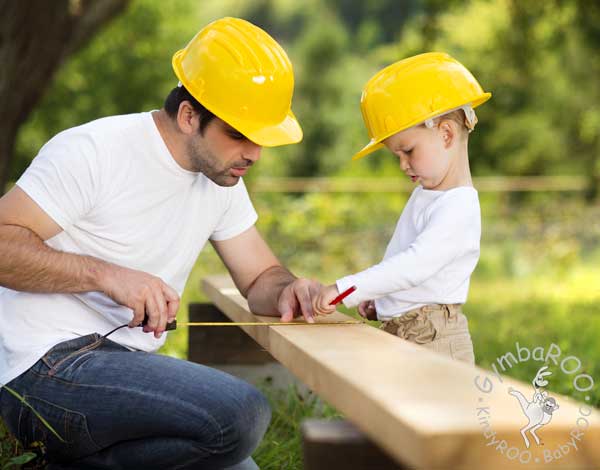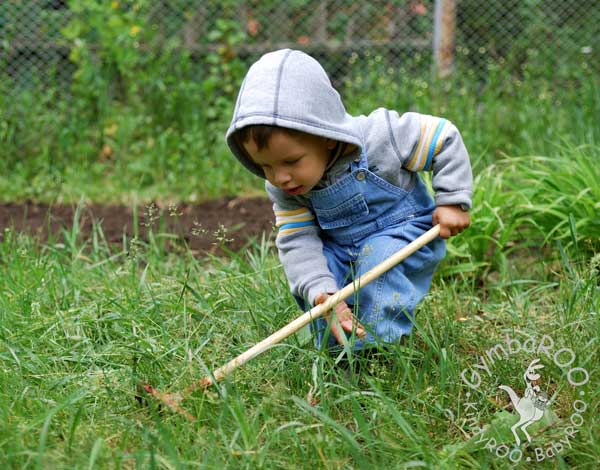Join the thousands of parents already raising smarter, happier babies with our online baby classes: The Active Babies Smart Kids series. Click here.
GymbaROO-KindyROO kids are excelling academically, emotionally, in leadership roles and on the sporting field. Find us at: GymbaROO-KindyROO
Enjoy reading the research supporting the developmental benefits and budding life skills that result from our precious little ones helping to lift, carry, clean and generally help out around the home. Read also: Chores for toddlers to 5 years: What chores at what age.
Kids and chores: The research into brain development
Giving children chores to do engages them in tasks, which promote motor development. This includes large motor activities such as washing a floor, digging in the garden, carrying a watering can, putting away groceries and sweeping with a broom. It also includes fine motor activities such as using a screwdriver, tearing lettuce for a salad, folding socks, cutting herbs with scissors and counting out four potatoes.
Early childhood is a period of major neuroplasticity, when learning actually changes the brain’s functional anatomy. Hands-on experiences are particularly vital at this time. In fact, the child who regularly engages with manipulatives such as arranging vegetables on a platter, setting the table and sorting the cutlery, and applies real-world mathematics such as measuring and pouring milk into a jug, taking things apart and putting them together and learning to follow simple recipes has a strong foundation of representational experience, which enables better understanding of abstract mathematical concepts when they are introduced later. These movement based tasks are also closely linked to the brain development necessary for reading and writing. Movement drives the development of every area of the brain and all learning ability. The complex processes of speech, reading and writing can only develop on a strong foundation of sensory-motor development. While doing chores, muscle messages to the brain are combined with visual, auditory and tactile input to form a total pattern, which represents an experience. Hence the old cliché, “We learn best by doing”.
Regular tasks allow children to see for themselves how the world works. They grasp principles of science as a seed becomes a tree, as boards are transformed into bookshelves, as flour and yeast turn into bread. They develop traits such as patience. They are motivated to apply what they are learning to more challenging endeavours of their own. Wonderful lessons in cause and effect are reinforced when children complete tasks and benefit from the results.
Dr Martin Rossman from the University of Minnesota undertook a longitudinal study, (subjects were followed up over a period of 20 years) which revealed that one of the best predictors of a child’s success is, if he or she began helping with household chores at age three to four. His study showed that children who participated in household tasks starting at age three or four were more likely to succeed in adulthood. He found these children completed education, met career goals, and maintained better relationships with family and friends.
Hands-on experience in all sorts of chores promotes learning, builds character, and helps to form the basis of children’s future selves. When neurologist Frank R Wilson interviewed high achievers, he found many credited their expertise to attributes learned through hands-on activities in their households. Wilson found that resourcefulness and self-definition arise from the use of the children’s body and hands while doing chores more than from the dictates of our educational system. He concluded that growing up with chores developed children’s confidence in their ability to complete a task and provided lessons in taking responsibilities, initiative, perseverance, resilience, self-discipline, practicing cooperation and working towards a goal.

As our children grow, doing tasks together can continue to strengthen our relationships. Moments of meaningful interaction happen easily when washing dishes, hanging out washing, fixing the car, or walking the dog together. Working on shared chores helps a child’s contemplative side emerge, prompting discussions that may never have happened otherwise. This is true between parent and child, as well as between siblings.
Expecting young children to take an active part in running a household and doing chores first and playing later gives them plenty of opportunity to gain positive coping skills that help them control their impulses and delay gratification. Daniel Goleman in his book ‘Emotional Intelligence’ found that children who were able to defer gratification grew into teens and young adults who were socially more competent, better able to deal with frustration, more dependable, reached higher educational attainments and were effectively able to make and reach long-term goals.
As our children participate along with us in the family unit, they feel the intrinsic purpose and satisfaction of doing something that has meaning. When learning is connected to something truly purposeful, it can’t help but kindle motivation. Children feel honoured to be included in real work that includes real challenges. If we pay close attention, we see that’s just what they pretend to do when they play.
Read now: Chores for toddlers to 5 years: What chores at what age
Marianne Schriever is a past School Principal and neuro-educational consultant for GymbaROO/KindyROO
References: Mary Sheridan – From Birth to Five Years. Dr Martin Rossman – Involving Children in Household tasks: Is it worth the effort? Published by University of Minnesota. Frank R. Wilson – The Hand: How its use shapes the brain, language and human culture.
GymbaROO-KindyROO
Thousands of parents, babies and children are presently involved in our programs and creating rising stars. GymbaROO-KindyROO kids are excelling academically, emotionally, in leadership roles and on the sporting field. Come join all the fun and learning! “GymbaROO – The best decision I ever made for my child.” Classes from 6 weeks old – 7 years GymbaROO KindyROO
Active Babies Smart Kids – Online Baby Classes
GymbaROO-KindyROO’s online series of baby classes is taking the parenting world by storm! It is highly recommended by doctors, paediatricians, early childhood experts and the Maternal Child and Family Health Nurses Association. This series is being called: “The essential guide for parents”. Join the thousands of parents already playing with their babies from birth, in the best way for brain and body development and laying crucial foundations for future learning. What happens in the first year, not only matters, it matters a lot! Enjoy the introductory video below.
Click here: Active Babies Smart Kids online series of baby classes
Try the first episode FREE: Tummy time + baby fun and development class 1
Enjoy the following GymbaROO-KindyROO articles
GymbaROO-KindyROO: Who, what, where, why and how
All about GymbaROO-KindyROO’s online baby classes for parents and babies: Active Babies Smart Kids
How to raise a smarter, happier baby
Help children develop healthy eating habits from the start.
Cooking with your toddler – So many learning opportunities.
Storytelling – More than just telling a story.
How and why to encourage your child to be a STEM thinker.
Kids learning ability jumps 2 years with 25 minute GymbaROO movement program 3x a week.
Why every young child needs a trapeze and how to make one.
Childcare, preschools and schools: Why to include a GymbaROO sensorimotor program.
GymbaROO / BabyROO: What parents say.

